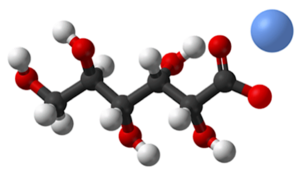Potassium

Potassium is both a chemical element and a mineral essential to the human body. Potassium is important for nerve and muscle function, and especially important for the heart.[1][2]
Potassium ion[edit | edit source]
Potassium ions, K+
, are important in conducting signals between cells. Potassium is an electrolyte.
Deficiency[edit | edit source]

The average person needs about 4,700mg of potassium per day.[1]
Low levels of potassium have been linked to a number of health problems including high blood pressure, heart disease, stroke, arthritis, cancer, digestive disorders, and others.[3]
A condition called hypokalemic periodic paralysis causes levels of potassium to drop too low, causing a temporary full or partial paralysis.
Theory[edit | edit source]
Evidence[edit | edit source]
Risks and safety[edit | edit source]
Excessive amounts of potassium on the blood can cause hyperkalemia, and even death.[2]
Potassium can also interact with many other drugs.[2]
Costs and availability[edit | edit source]
Potassium is available over the counter in the form of tablets or capsules, liquid, or soluble powder. It is a main ingredient in oral rehydration solutions, which was commonly used to treat dehydration. Potassium is also available for IV administration.
Foods[edit | edit source]
Potassium is also found in many foods, including bananas, avocados, almonds, peanuts, citrus fruits and, green leafy vegetables.[3]
Learn more[edit | edit source]
- Potassium Supplements: Benefits, Potassium Deficiency, Dosage and More - WebMD
- Hyperkalemia - drugs.com
- Linus Pauling Institute Micronutrient Information Center – Potassium
See also[edit | edit source]
References[edit | edit source]
- ↑ 1.0 1.1 "Potassium Supplements: Benefits, Potassium Deficiency, Dosage and More". WebMD. Retrieved February 27, 2021.
- ↑ 2.0 2.1 2.2 "Hyperkalemia - What You Need to Know". Drugs.com. Retrieved February 27, 2021.
- ↑ 3.0 3.1 "Potassium Supplements: Benefits, Potassium Deficiency, Dosage and More". WebMD. Retrieved February 27, 2021.

